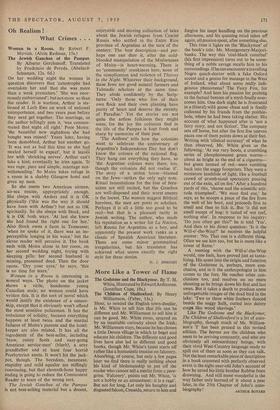Oh Realism What Crimes . . .
ON her wedding night the woman in question discovers that 'catastrophe had overtaken her and that she was more than a week premature.' She was enor- mously embarrassed'; but not more so than the reader. It is wartime, Arthur is sta- tioned at Loch Ewe on work of national unimportance, and two years pass before they next get together. The marriage, as the author tellingly puts it, 'was consum- mated that night all right.' Poor Moira: 'the beautiful new nightdress she had bought was ruined.' Years later, having been demobbed, Arthur has another go. 'It was not as bad this time as she had steeled herself to expect', but it leaves her with 'shrieking nerves'. Arthur can't take a hint; eventually he tries again. 'It was rape, pure and simple, marriage not- withstanding.' So Moira takes refuge in a room in a shabby Glasgow hotel and gives up men.
So she meets two American airmen, air-sea rescue, appropriately enough. She sleeps with Anders and it is OK physically ('this was the way it should have been with Arthur') but not so OK spiritually. So she sleeps with Stock, and it is OK both ways. 'At last she knew she had found the right one for her.' Also Stock owns a farm in Tennessee; 'when he spoke of it, there was an im- perceptible longing in his voice,' but the clever reader will perceive it. The book ends with Moira alone in her room, on her second wedding night, toying with sleeping pills: her second husband is missing, presumed dead. Then the door opens. 'Dry your eyes,' he says, 'this is no time for tears.'
Woman in a Room is interesting in several ways. The photo on the jacket shows a virile, handsome young Canadian male; no woman could have written this. It is the sort of novel which would justify the existence of a censor- ship, except that it obviously won't offend the most sensitive policeman. It has the unbalance of solidity, because everything happens at least twice and the marital failures of Moira's parents and the hotel- keeper are also related. It has all the ingredients of the best-seller, including 'braw, canny Scots and easy-going American service-men' (blurb), a sexy grandfather and at least four horrid Presbyterian aunts. It won't hit the jack- pot, though. The boredom, meanness, stupidity and mild squalor are stiflingly convincing, but that eleventh-hour happy ending is going to reduce the Commonest Reader to tears of the wrong sort.
The Jewish Gauchos of the Pampas is not best-selling material but a decent, enjoyable and moving collection of tales about the Jewish refugees from Czarist Russia who settled in the Entre Rios province of Argentina at the turn of the century. The best description—and per- haps one can dare it, after the cold- blooded manipulation of the Misfortunes of Moira—is heart-warming. There is no 'community' crankiness here, none of the complication and violence of Thieves in the Night. Whatever their background, these Jews are good natural farmers and Talmudic scholars at the same time. They abide confidently by the Scrip- tures: 'Only those who live of their own flock and their own planting have purity of heart and deserve the eternity of Paradise.' Yet the stories are not quite the artless folkiness they might seem, for the joy the colonists find in the life of the Pampas is kept fresh and sharp by memories of their past.
The Anthem' tells how the colonists want to celebrate the anniversary of Argentina's Independence Day but don't know the colours of the national flag. They hang out everything they have, so 'the Argentine colours were there, too, though the colonists did not realise it'. The story of a stolen horse—blamed on the Jews—strikes the only ugly note. Ritual lamentations for the loss of Jeru- salem are still recited, but the Gauchos are well-disposed and their worst enemy is the locust. The women suggest Biblical heroines, the men are poets or scholars. Perhaps it is all a little too good to be real—but that is a pleasant rarity in Jewish writing. The author, who made his reputation as a writer for La Nacion, left Russia for Argentina as a boy, and apparently the present work ranks as a classic of Spanish American literature. There are some minor grammatical irregularities, but his translator has achieved what seems exactly the right style for these stories.
D. J. ENRIGHT


























 Previous page
Previous page